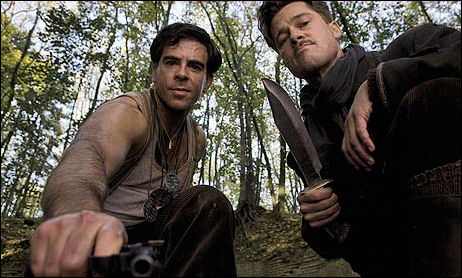Variety‘s Todd McCarthy has praised Quentin Tarantino‘s Inglourious Basterds as “a completely distinctive piece of American pop art with a strong Euro flavor…by turns surprising, nutty, windy, audacious and a bit caught up in its own cleverness, [it’s] an increasingly entertaining fantasia in which the history of World War II is wildly reimagined so that the cinema can play the decisive role in destroying the Third Reich.”

But the Guardian‘s Peter Bradshaw is calling it “a colossal armour-plated turkey from hell…awful…achtung-achtung-ach-mein-Gott atrocious. It isn’t funny; it isn’t exciting; it isn’t a realistic war movie, yet neither is it an entertaining genre spoof or a clever counterfactual wartime yarn. It isn’t emotionally involving or deliciously ironic or a brilliant tissue of trash-pop references. Nothing like that.”
And I called it “a fairly engaging Quentin chit-chat personality film in World War II dress-up. It’s arch and very confidently rendered from QT’s end, but it’s basically talk, talk, talk…low story tension…no characters are subjected to tests of characters by having to make hard choices and stand up for what they believe, and nobody pours their heart out. What they do is yap their asses off. Cleverly and enjoyably at times, yes, but brisk repartee does not a solid movie make.”
I didn’t say but am saying now that the best movies are always defined, in part, by the things that are not said — by undercurrents that you feel or sense but which aren’t directly commented upon. Inglourious Basterds has a delicious undercurrent of tension in the first Col.-Landa-vs.-French-farmer scene, but otherwise it’s pretty much all on the surface.












